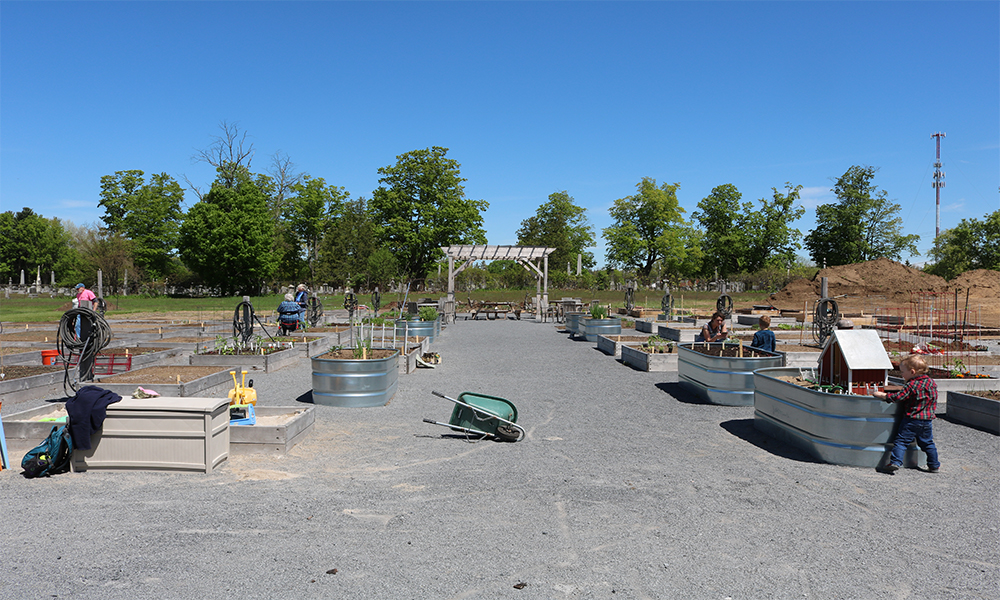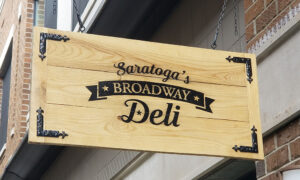It wouldn’t be wrong to assume that most young professionals in the region would be more interested in kicking off their career in the tech or healthcare industry than on a community farm. Then again, Aliza Pickering isn’t your typical 27 year old. Seven years ago, Pickering founded her first farm-based venture, launching her own Community Supported Agriculture (CSA) program—from which paying members can get fresh produce directly from farmers—on her parents’ farm in Arlington, VT, eventually connecting with and selling her hand-tilled yield to local restaurants. As of this past January, Pickering’s brought her top tilling and veggie business chops to Saratoga Springs’ 166-acre Pitney Meadows Community Farm, where she’s taken on the role of vegetable manager. Her plans for the nonprofit organization are ambitious: Besides supporting Pitney Meadows’ already popular 18-week Pick-Your-Own CSA program, Pickering’s looking to expand the farm’s yield so it can supply fresh produce to all Saratoga City Schools, the Franklin Community Center’s food pantry and Shelters of Saratoga (all paid for through state-funded grants). Additionally, she’s got her sights set on establishing a fruit-and-vegetable wholesale service that local restaurants and businesses can take part in, and has already landed high-profile partners such as The Adelphi Hotel, 15 Church and Skidmore College, which she’ll be providing produce to as early as this summer. All sales from this and other endeavors go directly toward funding the farm’s children’s programs, trail development, community gardens and giving garden.
While its CSA and future wholesale service may be relatively new concepts for Pitney Meadows, the farm’s no stranger to the agricultural space. The property, which sits along West Avenue in Saratoga, just down the street from the Saratoga YMCA and Saratoga Springs Senior High School, has been actively tilled since 1862, when farmer Jonathan Pitney first purchased the land. (In other words, it was up and running a year before Saratoga Race Course even existed.) From that point onward, the farm has remained solely in the Pitney family, and they’ve turned down many a lucrative real estate offer throughout the years. So in 2016, to ensure that the Pitney’s land didn’t become the next three-story luxury hotel or apartment complex, Jonathan’s descendants—William, Kathy and Judith Pitney—partnered with the city and county of Saratoga to preserve the farm’s 166 acres in perpetuity for farming, educational and recreational purposes. That’s a pretty big deal if you think about it: With the exception of maybe the Saratoga Spa State Park, it’s one of just a few undeveloped spaces left in the city—not to mention, one of the last operational farms within Saratoga city limits. To have more than 150 acres dedicated to organic and community farming so close to a bustling, ever-expanding downtown area is a true rarity.
Like any upstart nonprofit organization, Pitney Meadows’ future hinges heavily on innovative thought leaders such as Pickering to steer it into and beyond the 21st century. And she couldn’t have arrived at a better time: This year marks the farm’s first full growing season since it became a nonprofit in ’16, and Pickering’s in the tractor’s seat. “I came back from college and started a CSA similar to this one about seven years ago,” says Pickering. “It started as a typical CSA, and then we moved into wholesaling vegetables to restaurants and other businesses around town, because that’s where the money was.” Putting that model in place at Pitney Meadows was just part one of her plan. The farm is still in the process of building its own greenhouse, so Pickering started all of the farm’s seeds in Vermont, and is in the process of transporting them, crop by crop, from her home in the Green Mountain State, and preparing to plant them here in Saratoga. In short, Pickering has her work cut out for her. As Pitney Meadows’ vegetable manager, she and a handful of employees and volunteers are largely responsible for the success of the farm’s first crop. The 27 year old seems unfazed by the slightly daunting task ahead of her. “Back home, I was managing about the same type of acreage,” says Pickering. “So I feel comfortable with my skillset and what we’re trying to do this first season. Moving forward, though, it’s a big piece of land—there’s a lot to grow into, so that’s exciting.”

In addition to getting her jeans dirty in the fields, Pickering has also taught other upstart farmers how to farm—including women. “It seems like there are a lot of women getting into small-scale agriculture,” she says. “It’s not a rare thing to me.” She’s definitely onto something. According to the US Department of Agriculture’s Census of Agriculture, whose last reported data points on women in agriculture were published in 2012 (this year’s report won’t be available until October) noted that, even though the number of women farmers in the US was down slightly since 2007 (just under a million), the lion’s share of those women farmers were farming in the West, Southwest and yes, the Northeast. Even with so many women working on farms now, Pickering says there are still obstacles to overcome. “I think the difficulty is in peoples’ expectations—what men do in the workforce and what women do,” she says. “Sometimes you get a backhanded compliment like, ‘Oh wow, you know how to do that.'” Pickering doesn’t let gender inequality stats and sexism keep her from her goals; she’s determined to make Pitney Meadows a major success story. Once it’s fully operational, the farm will provide year-round educational programming taught by Pickering and others; and an expansive community garden, with more than 100 plots, open to gardeners of all levels. The farm will also boast recreational activities—hiking trails and a fishing station at Geyser Creek, which runs through a wooded portion of the property—and even some seasonal entertainment and musical performances. To that last point, the farm recently teamed up with Caffè Lena to offer a free, summer music series called Farm to Folk, which is open to the public and takes place right on the farm’s grounds. “America’s musical heritage evolved in the hands of farmers and people who lived off the land,” says Caffè Lena’s Executive Director Sarah Craig. “Making music with family and friends was a way to unwind and connect when the work was done. That’s the spirit we’re reviving with this series.” The first concert kicks off next Sunday, June 2, and will run every Sunday through July 28.
With so much to do at Pitney Meadows, Pickering’s just thankful she only has to worry about getting those crops planted and farming them. And she’s optimistic about this year’s growing season and the future of the farm. “You can see how much land there is,” she says. “That’s how much potential we have.”
















